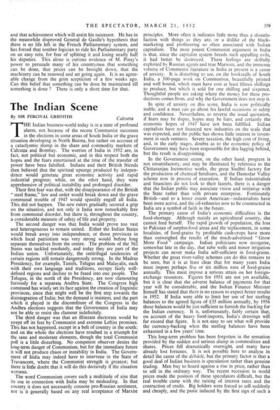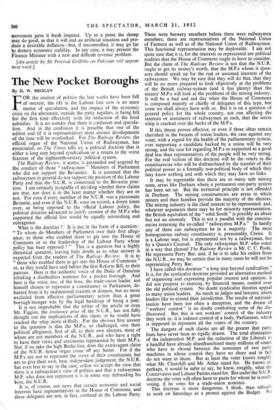The Indian Scene
THE Indian business-world today is in a state of profound alarm, not because of the recent Communist successes in the elections in some areas of South India or the grave situation developing in North Burma, but rather on account of a cataclysmic slump in the share and commodity markets of Calcutta and Bombay. The worries of India in 1952 are, in fact, not political but economic, and in this respect both the hopes and the fears entertained at the time of the transfer of power have been falsified. Indians and their, British friends then believed that the spiritual upsurge produced by indepen- dence would generate great economic activity and rapid industrial progress; while, on the other hand, they were apprehensive of political instability and prolonged disorder.
Their first fear was that, with the disappearance of the British " steel frame," law and order would break down and the grave communal trouble of 1947 would speedily engulf all India. This did not happen. The new rulers gradually secured a grip on the situation, and not only is India now remarkably free from communal disorder, but there is, throughout the country, a considerable measure of safety of life and property.
The second danger was that India would prove too vast and heterogeneous to remain united. Either the Indian States would break away into independence, or those provinces in which local patriotism was very strong would before long separate themselves from the centre. The problem of the 562 States was tackled resolutely, and today they are part of the Indian union. Unfortunately, the centrifugal tendencies of certain regions still remain dangerously strong. In the Madras Presidency, for example, Tamils, Telugus and Malayalis, each with their own language and traditions, occupy fairly well- defined regions and decline to be fused into one people. The Telugus, in the north of the Presidency, are now clamouring furiously for a separate Andhra State. The Congress high command has wisely set its face against the creation of linguistic provinces, since that might well be the first step towards the disintegration of India; but the demand is insistent, and the part which it played in the discomfiture of the Congress in the Andhra elections suggests that the Government of India may not be able to resist the clamour indefinitely.
The third danger was that an illiterate electorate would be swept off its feet by Communist and extreme Leftist promises. This has not happened, except in a belt of country in the south; and on the whole the elections have resulted in a triumph for the sane and moderate elements, though the total Communist poll is a little disturbing. No competent observer denies the long-term danger of Communism, but for the immediate future it will not produce chaos or instability in India. The Govern- ment of India may indeed have to intervene in the State of Travancore, where the Communist strength is greatest; but there is little doubt that it will do this decisively if the situation worsens.
The word Communism covers such a multitude of sins that its use in connection with India may be misleading. In that country it does not necessarily connote pro-Russian sentiment, nor is it generally based on any real acceptance of Marxist principles. More often it indicates little more than a dissatis- faction with things as they are, or a dislike of the black- marketing and profiteering so often associated with Indian capitalism. The most potent Communist argument in India is that, since the capitalist system breeds such appalling evils. it had better be destroyed. These feelings are skilfully exploited by Russian agents and true Marxists, and the immense volume of Communist literature in India at present is a cause of anxiety. It is disturbing to see, on the bookstalls of South India, a 500-page work on Communism, beautifully printed and well bound, which must have cost at least fifteen shillings to produce, but which is sold for one shilling and sixpence. Thoughtful people are asking where the money for these pro- ductions comes from, and why the Government does not stop it.
In spite of anxiety on this score, India is now politically stable, and a man can go about his lawful occasions in safety and confidence. Nevertheless, to reverse the usual quotation, if fears may be dupes, hopes may be liars, and certainly the economic hopes of 1947 have not been fulfilled. Indian capitalists have not financed new industries on the scale that was expected, and the public has shown little interest in invest- ment in such ventures. Severe taxation, the high cost of living, and, in the early stages, doubts as to the economic policy of Government may have been responsible for this lagging behind, but the result is ,disappointing.
In the Government sector, on the other hand, progress is not unsatisfactory, and may be illustrated by reference to the Chittaranjan locomotive works, the great Sindhri factory for the production of chemical fertilisers, and the Damodar Valley scheme now in process of execution. If Indian industrialists and financiers do not look to their laurels, there is a danger that the Indian public may associate vision and initiatiy with the State rather than with private enterprise. Fortunately British—and to a lesser extent American—industrialists have been more active, and the oil-refineries now to be constructed in India are a symbol of faith in the future.
The primary cause of India's economic difficulties is the food-shortage. Although mainly an agricultural country, she cannot feed herself. The rapid growth of population, the loss to Pakistan of surplus-food areas and the replacement, in some localities, of food-grains by profitable cash-crops have more than outweighed the results of the much-advertised " Grow More Food " campaign. Indian politicians now recognise, somewhat late in the day, that tube wells and minor irrigation projects can never make India self-sufficient in food-grains. Whether the great river-valley schemes can do this remains to be seen, but it is at least clear that for many years India must import perhaps five or six million tons of food-grains annually. This must impose a serious strain on her foreign- exchange resources. Figures for 1951 are not yet available, but it is clear that the adverse balance of payments for that year will be considerable, and the Indian Finance Minister himself has stated that there is no reason to expect better results in 1952. If India were able to limit her use of her sterling balances to the agreed figure of £35 million annually, by 1956 those balances would be just sufficient to furnish the backing for the Indian currency. It is, unfortunately, fairly certain that, on account of the heavy food-imports, India's drawings will far exceed that figure. It is not easy to see what will provide the currency-backing when the sterling balances have been exhausted in a few years' time.
This long-term problem has been forgotten in the sensation provided by the sudden and serious slump in commodities and shares. Prices fell dramatically overnight, and many have already lost fortunes. It is not possible here to analyse in detail the cause of the debcicle, but the primary factor is that a good deal of Indian business is speculation rather than genuine trading. Men buy to hoard against a rise in price, rather than to sell in the ordinary way. The recent recession in world prices made the position of these speculators difficult, but the real trouble came with the raising of interest rates and the contraction of credit. Big holders were forced to sell suddenly and cheaply, and the panic induced by the first sign of such a movement gave it fresh impetus. Up to a point the slump may do good, in that it will end an artificial situation and pro- duce a desirable deflation—but, if uncontrolled, it may go far to destroy economic stability. In any case, it may present the Finance Minister with a new and difficult revenue problem.
[An article by Sir Percival Griffiths on Pakistan will appear next week.]



































 Previous page
Previous page